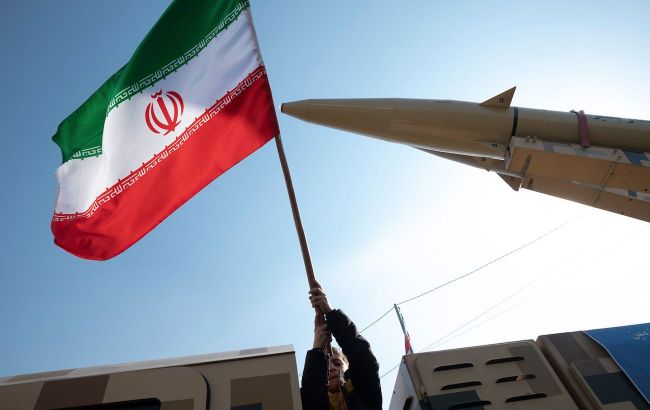Hundreds of drones and missiles: Iran's air strike on Israel, air defenses engaged across borders
 Illustrative photo (getty images)
Illustrative photo (getty images)
Iran attacked Israeli territory with hundreds of drones and missiles during the night of April 14. The IDF reports that almost all of them were shot down, and the damage from the attack Israel officially termed as minimal.
Read more about the attack in the RBC-Ukraine article.
The following sources of information were used in preparing the material: The Times of Israel, White House website, ABC News, New York Times, CNN, Newsru.co.il, Politico, Reuters.
First drones in the air
Iran launched the first strike drones towards Israeli territory late on April 13. This move was in response to a missile strike on the building of the Iranian consulate in Syria, which resulted in the death of a high-ranking Iranian general.
The IDF announced full readiness of air defense systems, with fighter jets airborne to track Iranian strike assets.
Simultaneously, Israel, as well as Jordan, Iraq, and Iran, closed their airspace.
Israeli Prime Minister Benjamin Netanyahu, in a video address to the nation, stated that Israel is prepared for an attack from Iran and will act on the principle of "whoever hurts us, we will respond in kind."
The US National Security Council confirmed the beginning of an air strike on Israel. President Joe Biden emphasized the "ironclad" support for Israel's security from the United States.
Onset of counteraction
The IDF reported that Israeli military personnel identified over 100 drones launched from Iran and are tracking their movements. According to journalists, Israeli intelligence also detected UAV launches from Iraqi territory.
There were reports in the media that Jordan was allegedly prepared to shoot down Iranian targets in its airspace, and Israeli aircraft were already shooting down Iranian drones over Jordan.
At the same time, the Iranian Defense Minister warned neighboring countries that any of them opening their airspace to Israeli aircraft for intercepting drones would become a target.
The IDF instructed residents of the northern Golan Heights, the Negev region in southern Israel, the city of Dimona, and Eilat to stay close to bomb shelters until further notice.
Air raid sirens were sounded in several regions of Israel, with explosions heard in Jerusalem and other cities.
Interception
Around 02:00 Kyiv time, reports emerged of the first Iranian drones and ballistic missiles shot down in the sky over Jerusalem and other cities.
According to KAN radio station, it specifically concerns ballistic missiles, not cruise missiles or strike drones, which Iran had previously used in the aerial attack on Israel.
American aircraft and destroyers, with support from the United Kingdom, participated in intercepting drones and missiles.
End of the attack
Also around 02:00, while the interception of aerial targets was still ongoing, the Iranian delegation to the UN stated that Tehran intends to limit itself to the initial wave of strikes on Israeli territory. However, the delegation emphasized that new waves of attacks are possible if Israel "acts foolishly," referring to a response to the strikes already carried out today.
Impact of the strike
According to the IDF, Iran used over 200 drones during the attack. American media, citing sources in the US, reported that Iran also launched around 150 rockets at Israel. It is noted that they were launched in several "waves": initially around 80 and then an additional 70 rockets.
The Israeli army stated that the "vast majority" of aerial targets were intercepted. The US reported that "almost all" drones and missiles were shot down.
As stated by IDF spokesperson Daniel Hagari, the strike caused minor damage to a military base in southern Israel.
He also noted that over 10 cruise missiles and dozens of drones were intercepted outside the country. According to him, a total of over 200 missiles and UAVs were launched.
World reaction
UN Secretary-General Antonio Guterres condemned the "serious escalation represented by the large-scale attack launched on Israel by the Islamic Republic of Iran." "I have repeatedly stressed that neither the region nor the world can afford another war," he noted.
The UN Security Council intends to hold a meeting today regarding the Iranian attack.
In the US Congress, Iran's attack has prompted bipartisan calls for the passage of a foreign aid package. It is expected that next week the House of Representatives will consider a bill to support Israel. This bill may include the $60 billion provision for military aid to Ukraine.
Biden announced that he will convene his G7 counterparts tomorrow to coordinate a "united diplomatic response to Iran's brazen attack."
Israel's Response Israeli media, citing sources, reported that Israel plans a "serious response" to the unprecedented drone launch from Iranian territory.
American media disseminated information that purportedly some US officials are concerned that Israel may quickly respond to Iran's attacks without considering the potential consequences. Biden reportedly privately expressed concern that Netanyahu is trying to drag the US into a wider conflict.
According to reports, Israel has pledged to coordinate its response with allies.


